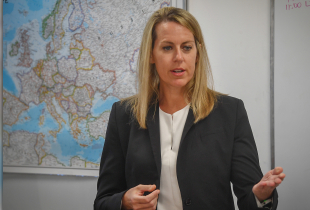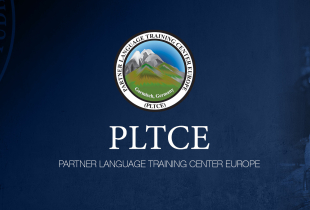
Annual NATO language conference reaches a global audience across 15 time zones
By Peggy Garza
Partner Language Training Center Europe
George C. Marshall European Center for Security Studies
GARMISCH-PARTENKIRCHEN, Germany (May 20, 2021) – The School of Foreign Languages of the Slovenian Armed Forces together with the Partner Language Training Center Europe, George C. Marshall European Center for Security Studies co-hosted the 2021 NATO Bureau for International Language Coordination Conference, May 10-14. More than 80 language professionals from 37 nations and representatives from five NATO organizations took part in the virtual event, sharing their experiences with defense language training and testing during these uncertain times.
Brig. Gen. Peter Zakrajšek, Commandant of the Military Schools Centre in Slovenia, delivered the conference opening remarks. He said, “The past year has been extremely challenging for everybody. Our mission to provide professional military education was put to a serious test.”
Zakrajšek reflected on the conference theme, Keeping Pace with the Times: Providing Flexible and Timely Training Solutions. He commented, “New ways, new formats, new materials were developed during the COVID-19 pandemic. The experience gained is invaluable and will help us provide flexible and timely training solutions in the future. The difficulties we had to face made us stronger, more resilient and more flexible providers of military education and training for the future.”
Language professionals from 14 different BILC-member nations, ranging from Australia to Canada, gave presentations and participated on panels. Many explained how some changes implemented during the COVID-19 pandemic would have an impact on language learning in the future.
In her presentation, “The Constant Switch from Onsite to Online-When Recurring Brakes Become the Driver,” Emilie Cleret, from the L’ecole de Guerre in France, spoke of the need for flexibility and adaptability in today’s language education. Cleret said, “Being adaptable means you are able or willing to change in order to suit different conditions. Being flexible means you can adapt easily. If you are resilient, then you’ll be able to withstand or recover quickly from unexpected or difficult conditions, adapting to (and often enjoying) change on a regular basis. Adaptability has to be the centre piece of course design and everything that supports the course – the teachers, the teaching method and the practical organisation.”
Dr. Dugald Sturges of Germany, discussed the pros and cons of the virtual learning programs at the Bundessprachenamt. Sturges stated, “We found that online language classes require a considerably higher investment of time to achieve the same results. In addition, it is essential for all learners to have equal access to the required technology. On-call technical support for both instructors and learners also must be provided to ensure that the online classroom functions smoothly.”
The two guest speakers highlighted the valuable links between BILC and NATO. The NATO HQ guest speaker, Pavel Anastasov, explained the NATO Defence Education and Enhancement Program process and the contributions BILC has made to DEEP. According to Anastasov, “There is a natural partnership between DEEP and BILC in building partner capacity. DEEP has leveraged BILC’s niche area of language training and testing expertise in DEEP-BILC joint projects in a dozen nations.” Anastasov concluded by citing BILC’s support for language training at the Defence Language Institute in Iraq as a huge success story.
The second guest speaker, U.S. Air Force Lt. Col. Zoltan Homonnay, Partnership for Peace Consortium, described the aim of the PfPC, its stakeholders, working groups, activities, and products. Homonnay emphasized the importance of language to NATO, saying, “Language interoperability is key to advancing NATO and NATO interests.”
Following Homonnay’s presentation, Peggy Garza, PLTCE, gave an example of the very productive collaboration between the PfPC ADL Working Group and BILC in designing and developing the online English Language Training Enhancement Course 2 and the NATO Writing Strategies Course. Garza remarked, “BILC language experts and the ADL WG’s instructional designers formed an ideal team. Working together we can produce high-quality e-learning courses for language learners.”
The BILC Chair, Branka Petek of Slovenia, confirmed that the BILC Conference achieved its goals and more. She noted the enthusiasm of the participants and the many informative and thought-provoking presentations. In her concluding remarks, Petek stated, “It is really important for nations that actively participate in BILC to continue their cooperation in times when meeting in person is not possible. The BILC community did not stand still during the COVID-19 pandemic. Nations were forced to introduce radical changes to continue language training in virtual or blended environments. This week we shared those experiences and considered how they might shape and influence tomorrow’s language training and language testing practices. We are now better prepared for the post-pandemic eventualities.”

